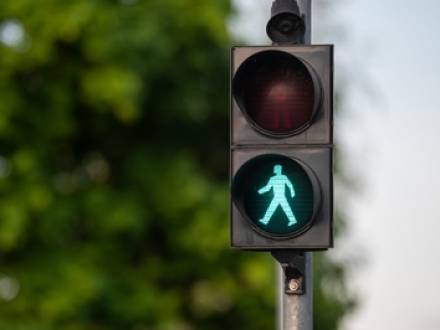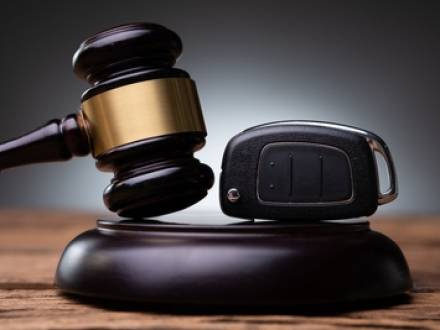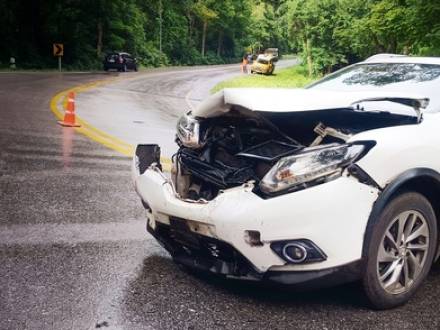Recent Blog Posts
Who Can File a Wrongful Death Claim in Virginia?
 Wrongful deaths are among the most devastating personal injury claims. Families are often left with the financial consequences of an already mentally and emotionally horrific incident. In Virginia, like many other states, surviving family members have an avenue to monetary compensation when they lose a loved one due to someone else’s negligence. The laws specify who is eligible to file a claim and what damages they can recover. If you have questions about your ability to file a wrongful death claim, a Fairfax, VA wrongful death attorney can help.
Wrongful deaths are among the most devastating personal injury claims. Families are often left with the financial consequences of an already mentally and emotionally horrific incident. In Virginia, like many other states, surviving family members have an avenue to monetary compensation when they lose a loved one due to someone else’s negligence. The laws specify who is eligible to file a claim and what damages they can recover. If you have questions about your ability to file a wrongful death claim, a Fairfax, VA wrongful death attorney can help.
Who Is Eligible To File a Wrongful Death Claim Under Virginia Law?
Virginia, the deceased person’s personal representative, meaning the executor of their estate, must file a wrongful death claim with one exception. Under § 8.01-50 of the Code of Virginia, there is an exception for mothers who lose fetuses due to the recklessness of another person.
Is Malicious Wounding Worse Than Assault in Virginia?
 "Violent crime" is an umbrella phrase encompassing many criminal charges that have varying categorizations, implications, and potential penalties. Among the charges are malicious wounding and assault. While the terms seem similar, the circumstances that warrant a charge for either are very different. If you have been charged with malicious wounding in Virginia, it is crucial that you understand the specific charges and allegations against you, and a Virginia criminal defense attorney can help.
"Violent crime" is an umbrella phrase encompassing many criminal charges that have varying categorizations, implications, and potential penalties. Among the charges are malicious wounding and assault. While the terms seem similar, the circumstances that warrant a charge for either are very different. If you have been charged with malicious wounding in Virginia, it is crucial that you understand the specific charges and allegations against you, and a Virginia criminal defense attorney can help.
What Is Malicious Wounding?
Virginia code § 18.2-51 defines malicious wounding as "the intent to maim, disfigure, disable, or kill" someone by shooting, stabbing, cutting, or otherwise wounding them. It is a Class 3 felony unless the illegal act was not done maliciously. In that case, it becomes a Class 6 felony. Aggravated malicious wounding is a more severe charge, categorized as a Class 2 felony.
What Damages Can You Recover After a Car Accident in Virginia?
 Car accidents are the most common form of personal injury claims. In Virginia, victims of careless drivers have the right to demand financial compensation for their losses, including the mental and emotional suffering they endured as a result of their injuries. An experienced Fairfax, VA car accident attorney will investigate the circumstances of your accident, identify the damages you can recover, and fight for your right to compensation.
Car accidents are the most common form of personal injury claims. In Virginia, victims of careless drivers have the right to demand financial compensation for their losses, including the mental and emotional suffering they endured as a result of their injuries. An experienced Fairfax, VA car accident attorney will investigate the circumstances of your accident, identify the damages you can recover, and fight for your right to compensation.
What Are Compensatory Damages?
Compensatory damages refer to the economic and noneconomic losses you can recover from a valid personal injury claim. The economic damages refer to financial losses and commonly include:
-
Past medical expenses incurred from treating your injuries
-
Future medical expenses for ongoing treatments
Hit by an Amazon Delivery Driver? Here Is What to Do Next
 Amazon delivery drivers are everywhere, making sure packages arrive quickly. However, with so many Amazon vans on the road, accidents are bound to happen. If you were injured in a crash caused by an Amazon driver, you may be facing medical bills, lost income, and significant pain and suffering.
Amazon delivery drivers are everywhere, making sure packages arrive quickly. However, with so many Amazon vans on the road, accidents are bound to happen. If you were injured in a crash caused by an Amazon driver, you may be facing medical bills, lost income, and significant pain and suffering.
Pursuing compensation after a collision with an Amazon delivery driver can be complicated because Amazon often classifies its drivers as independent contractors. A Virginia delivery driver accident lawyer can help you understand your legal options and properly file a claim for the damages.
Who Is Liable for an Accident Involving an Amazon Driver?
Determining responsibility in an accident with an Amazon driver depends on the driver's employment status. Unlike other major delivery companies, Amazon uses a mix of full-time employees and independent contractors. Liability may fall on:
What Triggers an IRS Audit?
 Filing taxes is never fun, but nothing is more nerve-wracking than receiving an audit notice from the IRS. While most people will never face an audit, certain tax return mistakes can raise red flags and increase the likelihood of IRS scrutiny about tax evasion. Even an honest mistake could lead to a time-consuming and stressful process. Knowing what triggers an audit and how to avoid common tax mistakes can help keep you out of trouble. If you are audited, a Virginia criminal defense attorney can help protect your rights and advocate on your behalf.
Filing taxes is never fun, but nothing is more nerve-wracking than receiving an audit notice from the IRS. While most people will never face an audit, certain tax return mistakes can raise red flags and increase the likelihood of IRS scrutiny about tax evasion. Even an honest mistake could lead to a time-consuming and stressful process. Knowing what triggers an audit and how to avoid common tax mistakes can help keep you out of trouble. If you are audited, a Virginia criminal defense attorney can help protect your rights and advocate on your behalf.
What Are the Most Common IRS Audit Triggers?
The IRS selects tax returns for auditing based on various risk factors, patterns of noncompliance, and random sampling. Some of the most common triggers include unreported income, excessive deductions, and repeated business losses. The IRS will cross-reference tax return information with W-2s, 1099s, and other financial records. If the numbers do not match, the agency may further investigate the situation.
Will There Be More Arrests for Street Racing in 2025?
 If signed by the Governor, a new Virginia law could mean more arrests and stiffer penalties for exhibition driving. Penalties for drivers convicted under the proposed law could include vehicle impoundment, jail time, the suspension of a driver’s license, and fines. Along with drivers, some passengers could also face fines. Although many reckless driving arrests are for misdemeanor offenses, some carry felony charges.
If signed by the Governor, a new Virginia law could mean more arrests and stiffer penalties for exhibition driving. Penalties for drivers convicted under the proposed law could include vehicle impoundment, jail time, the suspension of a driver’s license, and fines. Along with drivers, some passengers could also face fines. Although many reckless driving arrests are for misdemeanor offenses, some carry felony charges.
If you have been charged with reckless or exhibition driving, you need an experienced Fairfax, VA criminal defense lawyer to defend your rights and work toward a successful resolution to your case.
What Is Considered Exhibition Driving?
Virginia law currently forbids drivers from reckless driving, and it specifically refers to a speed and manner that endangers others. If enacted, the new law would expand reckless driving definitions to include exhibition driving. Some examples are:
What If a Hit-and-Run Driver Injures or Kills a Pedestrian?
 On January 29th, a tragic hit-and-run pedestrian accident in Fairfax County killed a mother and injured her young son. The duo was struck by an SUV, whose driver left the accident scene. Later, the driver abandoned the SUV.
On January 29th, a tragic hit-and-run pedestrian accident in Fairfax County killed a mother and injured her young son. The duo was struck by an SUV, whose driver left the accident scene. Later, the driver abandoned the SUV.
Pedestrian accidents typically cause extremely severe or fatal injuries. However, Virginia’s negligence law holds that injured victims cannot recover compensation if they are even partially to blame for causing their accidents. Hit-and-run accident claims can be challenging, especially when the victims are pedestrians. A knowledgeable Fairfax, VA personal injury attorney can evaluate your case and help you explore your legal options.
What Is Pure Contributory Negligence?
All states have laws that determine whether injured victims can pursue a compensation claim. Virginia is one of only a few states using pure contributory negligence. If you share any responsibility for causing the accident that injured you, you cannot seek damages from other at-fault parties. Do not assume you are partially to blame; instead, contact us so we can evaluate your case free of charge.
5 Types of Fatal Medical Malpractice
 Medical malpractice is one of the leading causes of wrongful death in the United States. The worst part about medical malpractice cases is losing your loved one – but a close second is the fact that these tragedies are almost always preventable.
Medical malpractice is one of the leading causes of wrongful death in the United States. The worst part about medical malpractice cases is losing your loved one – but a close second is the fact that these tragedies are almost always preventable.
If a family member passed away due to what you suspect was medical malpractice, you may be able to seek justice through a wrongful death lawsuit with the help of a Virginia personal injury lawyer.
Misdiagnosis or Delayed Diagnosis
When a doctor fails to diagnose a condition or delays a diagnosis, the consequences can be deadly. For example, misdiagnosing cancer as a less serious illness can prevent a patient from receiving life-saving treatment in time. Similarly, failing to diagnose a heart attack or stroke can leave a patient without the urgent care they need.
Is There Such Thing as a Federal DUI Charge?
 Most people have no idea that such a thing as a federal DUI charge exists until they find themselves on the receiving end of one. While most DUI cases are prosecuted under state law, there are indeed DUI charges under federal law. These cases generally involve driving under the influence on federal property or in circumstances where federal jurisdiction applies.
Most people have no idea that such a thing as a federal DUI charge exists until they find themselves on the receiving end of one. While most DUI cases are prosecuted under state law, there are indeed DUI charges under federal law. These cases generally involve driving under the influence on federal property or in circumstances where federal jurisdiction applies.
Because most DUI charges happen at the state level, it is very important to have a Virginia DUI defense attorney with experience handling federal DUI charges.
When Can You Get a Federal DUI Charge?
Federal DUI charges can only be brought in certain circumstances.
Driving on Federal Property
Federal property includes areas such as:
-
National parks and forests
-
Military bases
-
Federal government buildings or facilities
Recent Fatal Crashes: A Reminder That Speeding Kills
 Speeding is believed to have contributed to two recent fatal accidents in Fairfax County. Two people died in separate crashes, and another was seriously injured. Drugs or alcohol may have also been a factor in a crash on Dec. 14. Speeding and driving under the influence are illegal and negligent behaviors, and injured victims or their families may be eligible for compensation.
Speeding is believed to have contributed to two recent fatal accidents in Fairfax County. Two people died in separate crashes, and another was seriously injured. Drugs or alcohol may have also been a factor in a crash on Dec. 14. Speeding and driving under the influence are illegal and negligent behaviors, and injured victims or their families may be eligible for compensation.
Car accident cases can be complicated, even when speeding is a factor. You need the assistance of a competent Fairfax, VA attorney if you hope to get the full compensation you deserve.
What Is Negligence?
Negligence, which is careless or intentional behavior that can harm others, is the basis for most personal injury cases. Many driver errors are negligent, such as:

We Defend. We Recover.
You Move Forward
When You Call Robinson.
The use of the Internet or this form for communication with the firm or any individual member of the firm does not establish an attorney-client relationship. Confidential or time-sensitive information should not be sent through this form.
I have read and understand the Disclaimer and Privacy Policy.

Call 703-844-3746 Today
and Get the Help You Need










